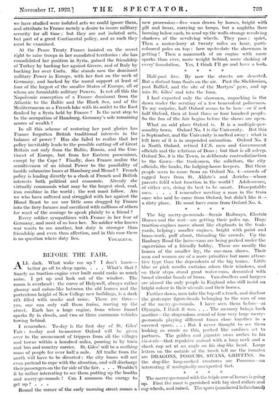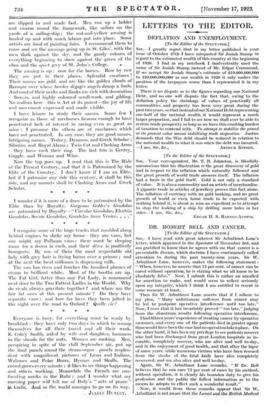BEFORE THE FAIR.
ALL dark. What woke me up ? I don't know— better go off to sleep again. . . . What's that ? Surely no traction-engine ever built could make so much noise. I get up and look out of the window. The moon is overhead : the curve of Holywell, always rather gloomy . and cafion-like between the old houses and the portentous height of New College new buildings, is a dark rift filled with smoke and noise. There are three— yes, one can only call them trains, roaring up the street. Each has a huge engine, from whose funnel sparks fly in clouds, and two or three enormous vehicles towing behind.
I remember. To-day is the first day of St. Giles' Fair : to-day and to-morrow Oxford will be given over to the amusement of trippers from all the villages and towns within a hundred .miles, pouring in by train and bus and country carrier. St. Giles' will be a seething mass of people for over half a .mile. All traffic from the north will have to be diverted : the city buses will not even pretend to cope with the situation, and will discharge their passengers on the far side of the fair. . . . Wouldn't it be rather interesting to see them putting up the booths and merry-go-rounds ? Can I summon the energy to getup? . . .
Round the corner of the.carly morning street-comes -a. new procession—five vans drawn by horses, bright with gilt and brass, carrying no lamps, but a naphtha flare burning below each, to send up the walls strange revolving shadows of the revolving wheels. They pass : quiet. Then a motor-lorry at twenty miles an hour, parti- coloured poles on top : how up-to-date the showman is getting ! Then a mammoth of an engine with more sparks than ever, more weight behind, more shaking of every foundation. Yes, I think I'll go and have a look.
Half-past five. By now the streets are deserted. But a distant hum floats on the air. Past the Sheldonian, past Balliol, and the site of the Martyrs' pyre, and up into St. Giles' and into the hum.
I had expected only the showmen, unpacking in the dawn under the scrutiny of a few benevolent policemen. To my surprise, half Oxford seems to be here—or if not half Oxford, then at least three or four hundred people. So the fun of the fair begins before the shows are open.
What an odd place Oxford is. It is a multiple-per- sonality town. Oxford No. 1 is the University. But this is September, and the University is melted away : what is left here of it is in suspended animation. Oxford No. 2 is North Oxford, retired I.C.S. men and Government officials and the relations of Dolls; but that is all asleep. Oxford No. 3 is the Town, in deliberate contradistinction to the Gown—the tradesmen, the solicitors, the city officials, the banks, the lodging-house keepers. But these people seem to come from an Oxford No. 4—crowds of ragged boys from St. Aldate's and Jericho—whose parents fulfil what function in the world ? Adolescence, of either sex, doing its best to be smart. Disreputable inen. . . . I remember meeting a man in the train once who said he came from Oxford, but didn't like it— a dirty place. He must have come from Oxford No. 4.
The big merry-go-rounds—Scenic Railways, Electric Horses and the rest—are getting their poles up. Huge traction-engines move about like elephants in the teak- yards, helping ; smaller engines, bright with paint and brass-work, puff about, threading the crowds. Up the Banbury Road the horse-vans are being parked under the supervision of a friendly bobby. These arc mostly the homes of the smaller fry, the one-man shows. Their mcn and women arc of a more primitive but more attrac- tive type than the dependents of the big trains. Little blue or pink muslin curtains adorn their windows, and on their steps stand great water-cans, decorated with broad circular bands of.brass. Van-dwellers and bargees are almost the only people in England who still insist on bright colour in their utensils and their homes.
Further down, men take the top off a truck, and disclose the grotesque figure-heads belonging to the cars of one of the merry-go-rounds. I have seen them before—at Olympia, I think it was. . . . The memory brings back another—the stupendous sound of four very large merry- go-rounds playing different tunes close together in a covered space. . . . But I never thought to sec them looking as comic as this, packed like sardines set to partners. The golden and gigantic swan arches to his vis-a-vis—that repulsive animal with a long neck and a check cap set at an angle on his dog-like head. Large letters on the outside of the truck tell me the inmates are DRAGONS, POSSUMS, SWANS, GRIFFINS. So the dog-like long-necked creatures are Possums—au interesting if zoologically-unexpected fact.
The merry-go-round with the triple row of horses is going up. First the mast is garnished with big steel -collars and cog-wheels, and raised. The spars (numbered beforehand) are slipped in and made fast. Men run up a ladder and swarm round the framework, like sailors on the yards of a sailing-ship ; the red-and-yellow awning is hauled up and with much labour put into place. Some artists arc fond of painting fairs. I recommend them to come and see the awnings going up in St. Giles', with the men dark against the sky, and the gaudy colours of everything beginning to show against the green of the elms and the quiet grey of St. John's College.
The awning is up : now for the horses. Row by row they are put in their places. Splendid creatures ! Their manes are gold, and are like the golden clouds of Baroque over whose border degages angels droop a limb. And most of their necks and flanks arc rich with decoration —llowers, and highly coloured scroll-work, and gilding. No realism here—this is Art at its purest—the joy of life and movement expressed and made visible.
I have leisure to study their names. Some few I recognize as those of racehorses famous enough to have penetrated lack of interest in racing even as great as mine : I presume the others are of racehorses which have not penetrated. In any case, they are good names, intriguing names. Tedney, Dynamo, and Greek Scholar.; Silurian and Royal Alarm ; Twin Cat and Clashing Arms - - they have each their ring. The last trio is Gentry, Gaggle, and Woman and Wine.
Now the top goes up. I read that this is The Ride of the Present Century, and that it is Patronized by the Elite of the Country. I don't know if I am an Elite, but if I patronize any ride this century, it shall be this ride, and my mounts shall be Clashing Arms and Greek Scholar.
I wonder if it is more of a draw to be patronized by the Elite than by Royalty. Gorgeous Golder's Gondolas arc patronized by Royalty—" Circular Gondolas, Electric Gondolas, Scenic Gondolas, Gondolas from Venice. . . ."
I recognize some of the huge trucks that rumbled along behind engines to shake my house—they are vans, but one might say Pullman vans : there must be sleeping room for a dozen in each, and their decor is positively bourgeois. By one of them the most respectable old lady with grey hair is frying bacon over a primus ; and at the next the local milkman is dispensing milk.
The sun has risen and touches the hundred plumes of steam to brilliant white. Most of the booths are up. The Fat Girl, fatter than any Fat Lady, is announced next door to the Two Fattest Ladles in the World. Why do rivals always gravitate together ? and where are the fair fat ones at this present minute ? Do they have separate vans ; and how far have they been jolted in the night over the road to Oxford ? Queue vie !
Everyone is busy, for everything must be ready by breakfast : they have only two days in which to recoup themselves for all their travel and all their work. E. Cokey Smith, aided by wife and daughter, hammers in the stands for the nuts. Women are cooking. Men, perspiring in spite of the chill September air, put up the final panels round the steam-organ—panels resplen- dent with magnificent pictures of Lions and Indians, Walruses and Polar Bears, Hyenas and Skulls. The crowd grows every minute : it likes to see things happening and others working. Meanwhile the French are con- liscating marks in the Ruhr : :-and I wonder what my morning paper will tell me of Italy's " acts of peace " in Corfu. And so the world manages to go on its way.
JCLIAN ULTXLEY.



























































 Previous page
Previous page